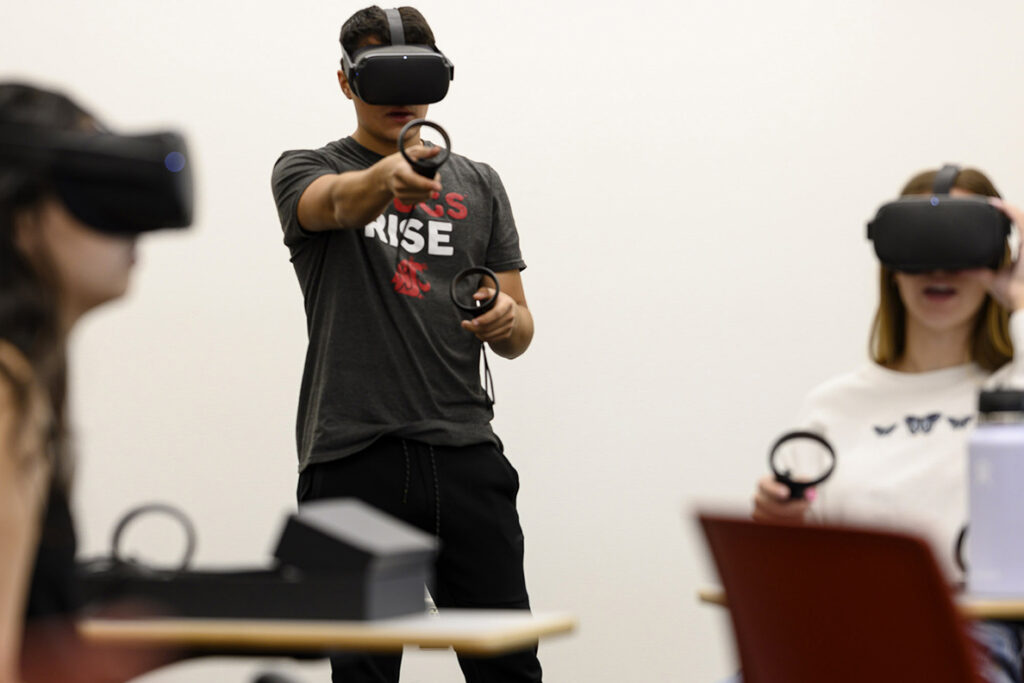Wearing white virtual reality headsets, high schoolers from across the state will connect this fall to Washington State University students—not to play 3D games but to develop academic skills and build the confidence necessary to succeed in college.
“Using cutting-edge technology, we’re using immersive VR experiences to engage in simulated environments that give the sense that the students—or actually their avatars—are meeting in person with their WSU student mentors,” said Ray Acuña-Luna, director of College Access Programs in the Office of Academic Engagement (OAE). It is part of the Division for Academic Engagement and Student Achievement (DAESA).
Those avatars might connect in the Cougar Lounge, a simulated room created just for this project and set on the WSU campus, decorated with WSU logos and Coug themed swag. Or mentees and mentors could leave the lounge and walk through a campus scene talking over a problem. They could work on math problems on a virtual whiteboard, talk to a professor lent a VR headset for the session, go to simulated lecture halls, or search for 3D models of concepts in their area of academic interest such as organs from a body, archeological sites, and the solar system. Anything a simulated environment or experience can offer, the project participants can explore.
“It’s a novel yet fun way to approach learning, and we believe the students as well as the mentors will find new and valuable ways of communicating even though they are miles away from one another,” said Acuña-Luna.
A Cougs Rise endeavor

The VR mentoring project is part of OAE’s Cougs Rise, a U.S. Dept. of Education grant-funded program. At WSU, it aims to help low-income and first-generation students from five high schools build a network of resources and engage in high-impact educational experiences. WSU student mentors reach out frequently to high schoolers in the program to help with everything from coursework to goal setting to connecting them with WSU faculty in their area of interest and more. The VR project is new to Cougs Rise.
Sixty headsets will be sent to high school participants while mentors in Pullman will have their own sets to wear during sessions. The enterprise project combines Victory XR software for educational experiences and the Engage platform to create a remote VR learning environment using Oculus Quest II hardware.
During this year’s summer bridge program, Cougs Rise mentors test drove the project. Jessica Garibay, project assistant and senior in criminal justice and psychology from Wenatchee, Washington, found the experience fascinating and successful.
“I’ve been with Cougs Rise in various roles since my first year at WSU, and we always look for innovative ways to engage with our high schoolers,” she said. “We’re ahead of the curve again with the VR project. It’s a great way to overcome the struggles everyone’s experienced during the pandemic as we try to connect in meaningful ways with our mentees. The VR project is a great way to engage better with them now and into the future. “
A collaborative project
Acuña-Luna said the VR project sparked collaboration. Jo Ann Arinder, doctoral student in language literacy and technology in the College of Education, has helped mentors and mentees set up their project accounts and learn to use the technology. The project and results will be used in her research.
Her interest ties to the emerging science of using VR for educational purposes. There’s the dual coding theory aspect, where subjects learn through visual and auditory experiences. And the utilization of universal design for learning, anapproach to teaching and learning that gives all students equal opportunity to succeed with barriers to learning removed.
Acuña-Luna sees future possibilities for the project could involve more faculty “jumping into a VR room to answer questions to help students.” As the project moves forward, he envisions that interested faculty will receiving training to help them interact effectively with students in the new environment. For the moment, he’s eager to get the VR headsets out to the high school mentees. Interested faculty are encouraged to reach out.
“We believe everyone involved will become even more engaged in learning, and exploring the technology together. It’s an incredible opportunity and we’re excited to be able to offer it.”







